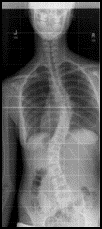Welcome to Miller Scoliosis Lab
Lab Director, Nancy Hadley Miller, M.D., M.S.
Miller Scoliosis Lab Research
The Miller scoliosis lab is at a critical meeting point between clinical research and basic science. We utilize clinical specimens (maybe from you!) to achieve our goal of broadening the scientific community’s knowledge of the complex molecular
underpinnings, including the genetics, of idiopathic scoliosis. Our research includes analysis of clinical specimens collected over decades, and we believe understanding this condition fully at the molecular level may one day lead to new detection,
prevention, and treatment options for the estimated ~2% of the worldwide population with idiopathic scoliosis (IS). 
Exome Sequencing in Families with Idiopathic Scoliosis
Our NIH R01 focuses on performing exome sequencing on 100 samples from our cohort of scoliosis families in an effort to discover variants suspected of causing the disease. We will carefully select affected and unaffected individuals from our pedigrees for the most statistical, genetic, and clinical relevance.
 Functional Models of Idiopathic Scoliosis
Functional Models of Idiopathic Scoliosis
Following exome sequencing, we will perform
functional studies of the identified variants and genes suspected of causing idiopathic scoliosis (IS) in a zebrafish and mouse models using CRISPR-Cas9, in collaboration with Dr. Bruce Appel’s and Dr. Ryan Gray. Additionally, we will analyze the
effects of specific variants found in humans in tissue culture models using siRNAs, followed by patient-specific CRISPR-Cas9 mutations.
Transcriptomic Profiling of Progressive Idiopathic Scoliosis
In collaboration with Dr. CJ Kleck, we will analyze mRNA and protein from the bone and cartilage of individuals with and without scoliosis. Discarded tissues will be collected from spinal surgeries and brought back to the lab for nucleic acid and protein extraction, cell culture analysis, and histology.Identical Twins with Idiopathic Scoliosis
Identical twins with scoliosis offer a unique opportunity to study factors that may contribute to IS other than the genome. Using Illumina methylation profiling, we will analyze the methylome of identical twins with IS that have the same or different spinal curvatures.Biobank
Biobanks are collections of biological materials used for research purposes, which may be shared with a certain scientific community to further their own research. The Miller scoliosis lab has recently embarked on the creation of a biobank of pediatric DNA and tissue samples, which can be shared among collaborators who are also investigating IS (in accordance with COMIRB rules and each participant’s informed consent).Collaborators
Ken Jones (Department of Pediatrics, University of Colorado Anschutz Medical Campus)Ryan Gray (Department of Pediatrics, University of Texas at Austin, Dell Medical Campus)
Karin Payne (Department of Orthopedics, University of Colorado Anschutz Medical Campus)
Patrick Carry (Musculoskeletal Research Center, Children’s Hospital Colorado)
Lee Niswander (Department of Pediatrics, University of Colorado Anschutz Medical Campus)
Bruce Appel (Department of Pediatrics, University of Colorado Anschutz Medical Campus)
Christina Gurnett and Matt Dobbs (Washington University)
Alec Wilson and Cristina Justice (NHGRI)